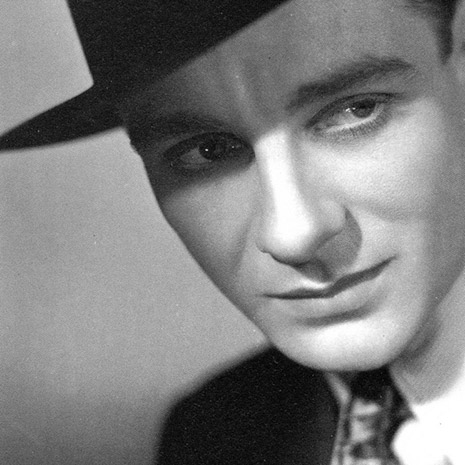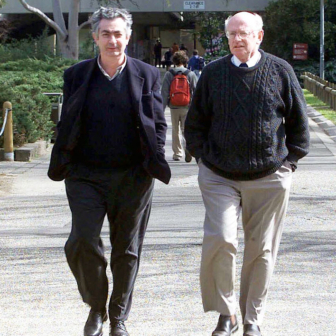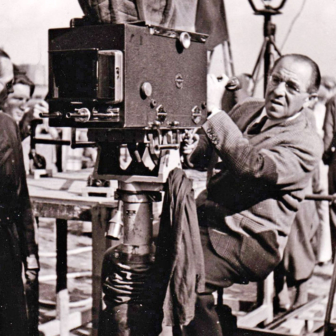John Gielgud: Matinee Idol to Movie Star
By Jonathan Croall | Methuen Drama | $75
BIOGRAPHIES of stage and screen luminaries generally fall into roughly two categories. There are the “authorised” kind, which can often tip into the deferential, and the “unauthorised,” which are apt to be more concerned with dishing the dirt. As one who has read a lot of these, hoping against hope for scraps of useful information, I find it hard to say which of these two species I like less. So great an actress as Judi Dench surely warranted something more rigorous than John Miller’s hagiography; from the other corner, even Elizabeth Taylor deserved a better treatment than she had at the hands of arch scandal-monger Kitty Kelley, in whose pages Taylor emerged as a loud-mouthed, ignorant trollop. Somewhere between the extremes of reverence and muck-raking there is a small space for a more trustworthy go at the lives of the famous, and that is where Jonathan Croall belongs.
No doubt it is more difficult to write about theatre people than film stars if the author wants to convey a palpable sense of performance and style. Films exists as enduring texts, endlessly replicable and, these days at least, readily available to the serious-minded biographer. Stage performances are of their very nature susceptible to minor changes from night to night and, unless someone has cunningly recorded the show on video (or whatever the latest medium is), their existence for posterity depends largely on the fallibility of memory. Largely, but not wholly, as John Gielgud: Matinee Idol to Movie Star reveals.
The third not very profound point I want to make in this skirmishing introduction derives from my personal experience. In 2002, I was asked to review Sheridan Morley’s casually under-researched, vulgarly sniggering biography of Gielgud. This was trumpeted as “the authorised biography”; given its sleazy approach to its subject’s sex life and slipshod attention to all sorts of detail, he was probably lucky that Gielgud was dead by the time the book appeared. It was enough to make one almost nostalgic for the sorts of “authorised” lives that seem to genuflect before their subject. As I was finishing my review of that book, it was drawn to my attention that there was a second, even longer life of the recently deceased acting knight – and would I like to add this to the review? Nothing seemed less attractive to me at that point, but in fact I did read Jonathan Croall’s Gielgud: A Theatrical Life 1904–2000, and felt I’d discovered a new level of intelligence and perception at work in a genre not notable for these qualities.
Since then, Croall has authored a commanding biography of Sybil Thorndike (2008) – a critical celebration of one of the indisputable heroines of the twentieth-century stage – and, now, this second edition of his already impressive Gielgud biography. A second edition of such a book is pretty unusual, I guess, but in this case it has been utterly justified. He has had access to Gielgud’s private papers and to several hundred previously unpublished letters to and from the actor, and these are often intensely revealing about his approach to his craft and to his associates. As well, Croall has conducted over a hundred new interviews with people who knew and worked with Gielgud, particularly during the film career that burgeoned in the latter half of his life.
Croall comes from a theatrical background – his father was the silent film and early talkie star John Stuart, his mother a drama-school teacher – and he also works as a theatrical journalist attached to the Old Vic and the National Theatre. As well as books on other subjects, he has written compelling studies of plays in rehearsal (including Hamlet and Waiting for Godot) when he has had access to directors and actors involved, some of these finding their way into the entertaining collection Buzz Buzz! Playwrights, Actors and Directors at the National Theatre. All of this no doubt helps to account for the whiff of authenticity that blows so persuasively through Gielgud 2, as I’ll call it. He knows what the theatre is like as a place of work for those who do the work, and allies this to a notable critical sensibility and scholarly regard for research.
Halfway through his life Gielgud embarked on a one-man show called Ages of Man, a compendium of Shakespearean speeches. The very title (drawn from As You Like It) seems to hint at the life of this man whose years coincided almost completely with those of the century. As well, though, it encapsulates a career that achieved the highest distinction at virtually every age in all the acting media. Given that he was descended on his mother’s side from the Terry family, British theatre royalty, and that, as Croall tells us, “there was also theatrical blood in his father’s family,” it was not surprising that John, youngest of the three Gielgud sons, should turn to the stage. As brother Val (author and producer) recalls, “The theatre, the inevitable aura of the Terry dynasty, lay all about us in our infancy.” This biography evokes the early life of comparative middle-class comfort and cultivation in which the young John, with his toy theatre, set out on the adventure of his prolific and creative life.
In the theatre from his teens, and the century’s twenties, he established himself as an idol of Shakespearean interpretation, particularly in relation to his legendary Hamlet and his matchless prowess as a verse-speaker. In his own words, “I threw myself into the part like a man learning to swim, and I found that the text would hold me up if I sought the truth in it.” He was then a mere twenty-six, whereas the famous Hamlets, as Croall points out, had tended to come from actors with reputations already well established. But it was his Richard II, at the Old Vic in 1929, that constituted his “breakthrough.” Croall writes eloquently of Gielgud’s affinity with Richard: “The role of the young, headstrong and self-absorbed king luxuriating in his downfall had always attracted him. Previously he had been impressed by the play’s pictorial qualities; now he became excited by the beauty and exquisite melancholy of the poetry.” I quote this to display the author’s astute evocation of Gielgud’s stage roles; it also makes a neat juxtaposition with the actor’s own perception of the part. He recalled: “[Richard] was a shallow, spoiled young man, vain of his looks, with lovely things to say. I fancied myself no end in the part, but even that seemed to help my acting of it.” Biographies of stage players do not often give us such a sense of an actor inhabiting a role.
BUT the nearly eighty-year career, begun as a soldier in Henry V at the Old Vic in 1921, was by no means confined to Shakespeare – or just to acting. He became the actor-manager who famously brought the classics back to London’s commercial West End, for instance, offering a repertoire that, in hindsight, seems to have anticipated the National Theatre of several decades later. The book is very enlightening about Gielgud as director. Many actors testify to (a) their affection for him in this function and (b) how his constant changing of his mind sometimes drove them to the very brink of desperation. The results, however, generally led to widespread forgiveness. This biography, though, is not just a list of plays, skimpily glossed with random quotes from newspaper critics. It constantly makes the reader aware of large movements in the life and career of its subject and, in the process, of similar movements in the cultural life of the times.
A potentially catastrophic episode might have damaged irrevocably an actor held in less esteem by his colleagues and, indeed, his public. In 1953, Gielgud was arrested for homosexual soliciting in a public lavatory. Whereas one felt the Morley biography made a meal of this sad business, Croall treats it with matter-of-fact sympathy. Although he doesn’t underestimate the emotional turmoil it caused the actor, there is no smacking of the lips over it, and Gielgud’s sexual orientation is seen as a crucial aspect of his life but not a matter for prurience.
Another ongoing aspect of Gielgud’s professional career was the wariness of his dealings with Laurence Olivier, his chief contender for actor-of-the-century garland. In fact, the wariness seems chiefly to have been on Olivier’s side; wariness more than tinged with jealousy, so that he contrived to keep Gielgud more or less sidelined in the creation and operation of the National Theatre. Their acting styles were very different: whereas Olivier cut a dash for the flamboyant physicality of his approach, Gielgud’s was always a more reflective style and his verse-speaking was unparalleled. Croall deals with this matter of their “rival merits” with characteristic even-handedness, and summarises the attempts to whip up such debate as follows: “Those who ventured an opinion deemed Olivier the more versatile actor, having more power and attack, and a wider range of expression. Gielgud, on the other hand, was agreed to have the finer voice – especially for poetry – greater poignancy, and more subtlety.”
Because both also took to films, we can at least view some of the evidence for such views, but it is Gielgud who concerns us here. He was never really an impressive leading man, as early films such as Hitchcock’s Secret Agent attest; and, after a turn as Disraeli in The Prime Minister in 1941, he made no further features until 1952 when he played a devious Cassius in the intelligent Hollywood version of Julius Caesar, winning the admiration of the film’s Antony, Marlon Brando. From here on, his career, unabated on the stage, is liberally sprinkled with some matchless work in films, occasionally in star roles like those he played in Alain Resnais’s Providence and Peter Greenaway’s Prospero’s Books (and how glad we should be to have preserved on film one of his defining roles) but more often in character parts. He won a Best Supporting Actor Oscar for his snooty British manservant to Dudley Moore’s sybaritic drunk in Arthur, but there are really more notable achievements elsewhere. The strife-wearied Henry IV in Chimes at Midnight, Orson Welles’s glorious extrapolation of Shakespeare’s second tetralogy; the hellfire preacher in Portrait of the Artist as a Young Man; the proto-greenie Cornelius Cardew in The Shooting Party; and the dying Mr Touchett in The Portrait of a Lady: the range and treasurable precision of these, among many others, including such television triumphs as Mr Ryder in Brideshead Revisited, ensure his place in film, as well as in theatre, history.
And it is from film that future generations will know his work. Well, from film and from Jonathan Croall’s biography, with its insights about the interaction of life and career, discernment of human frailties along the spectrum of fondly regarded longevity, bringing to life of so many theatrical successes, and perceptive response to those performances preserved on film. These are but some of the virtues of Gielgud 2. If what you want from the genre of showbiz biography is sleaze or sycophancy, you’ll have to look elsewhere. What is on offer here is something else. Croall manages the difficult balancing act of maintaining a discreet distance from his subject while at the same time seeming to have immersed himself in that subject’s complexity. There is unlikely to be any need for a Gielgud 3. •




